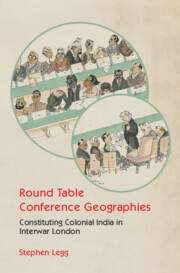Book contents
- Frontmatter
- Contents
- List of Figures and Tables
- Acknowledgements
- Note on Conversions, Spellings and Abbreviations
- 1 Introduction: Squaring Round Tables
- Part I Geographical Imaginations
- Part II Conference Infrastructures
- Part III The Conference City
- Part IV Representations
- Notes
- References
- Index
- Miscellaneous Endmatter
4 - The Conference Method: Between Intention and Desire
Published online by Cambridge University Press: 15 January 2023
- Frontmatter
- Contents
- List of Figures and Tables
- Acknowledgements
- Note on Conversions, Spellings and Abbreviations
- 1 Introduction: Squaring Round Tables
- Part I Geographical Imaginations
- Part II Conference Infrastructures
- Part III The Conference City
- Part IV Representations
- Notes
- References
- Index
- Miscellaneous Endmatter
Summary
For the time being, it probably would be better not to be too definite, in order that we may evoke from possible participants in the Conference an expression of their views and see if we can hit upon the happy mean which will achieve a successful attendance without committing us more fully than we desire or intend.
– Benn to Irwin, 1 May 1930On 1 May 1930, Secretary of State for India Benn wrote a private latter to Viceroy Irwin, six months after the latter had announced that Indian representatives would be invited to a Round Table Conference (RTC) in London. In it he suggested that having set the conference date and the method of selection of personnel, it was time to turn to the difficult question of what the functions of the conference were supposed to be. As the quote above suggests, from the outset the conference promised to be a phantasmagorical technology, one that would successfully attract Indian delegates via the most limited of British commitments. It would be a machine whose design would protect the British from extending beyond both their desires and intentions. Benn suggested that his ‘happy mean’ would exist between two extremes visions of how the conference would function. At one pole was a virtual RTC that would merely examine and comment upon the Simon Report. An opposite virtual conference would be that of the Gandhi’s veteran supporter C. F. Andrews, whom Benn had met the day before, who suggested that the role of the British was simply to record the agreement reached by Indian delegates in London and to then pass these agreements through parliament. Benn suggested that the task for himself and Irwin was to pursue a conference ‘line’ between these poles, which would entice both Indian and British political opponents to the round table.
After a month’s work, Benn wrote to Irwin on 29 May regarding the conference’s terms of reference, suggesting that ‘I have no doubt at all that, fundamentally, this is the key of the situation, and if I had had any doubt, it would have been removed by the torrents of advice which I have been receiving on this point’.
- Type
- Chapter
- Information
- Round Table Conference GeographiesConstituting Colonial India in Interwar London, pp. 101 - 129Publisher: Cambridge University PressPrint publication year: 2023



